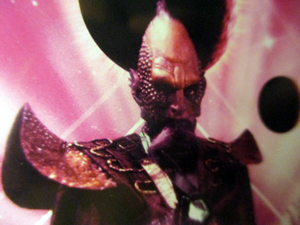Frontier in Space
“Fear is the greatest enemy of them all, for fear leads us to war.” – The Doctor
After many episodes of disappointing costumes and dodgy CSO, this episode suddenly kicks the visuals up several notches. The Draconians represent some of the best alien costume and make-up design of the era. The model work of the spaceship is miles above anything done to this point, not just on the ships but the backgrounds as well. The short scene of the TARDIS spinning in space just before the crash is especially well done. For once nothing is too over the top. It’s a shame, therefore, that all this extra effort is put into one of the least adventurous and least engaging storylines of the Pertwee era. It’s not a bad script overall (except for the disastrous ending)—in fact it’s quite a well done piece of social drama with marvelous parallels to the real world of suspicion between races, political games, protest movements, and more. I guess it’s the most grown-up Doctor Who story of Pertwees era. It just lacks any of the sci fi oddities and sense of adventure that are key to the program and must have been rather boring for the children watching the original broadcast.
There are a few nice surprises. The Master’s arrival is truly unexpected and he gets the upperhand for once because his plan is actually reasonable and well-planned. (Like all the work he puts into creating false criminal background records for the Doctor and Jo or tricking Jo into thinking she’s outwitted his plan only to learn that her escape was part of it.) It’s even more of a surprise to learn he’s secretly working for the Daleks with a harsh edge. (“My skill and cunning has brought about this war which will make you the masters of the galaxy. Leave the Doctor with me, and let him see the result of that war. Let him see the galaxy in ruins. Let him see the planet Earth, that he loves so much, in ruins.”) This seems out of character but just when we think he’s kowtowing to the Daleks that he turns around muttering to himself: “Right, we’ll see who rules the galaxy when this is over. Do not fail the Daleks, indeed! You stupid tin boxes!”
As he has done in previous episodes, Malcolm Hulke paints an intriguing version of future earth (in this case 26th century) through our overhearing news broadcasts or political debates. Everyone’s dialogue sounds very reasonable and natural. The casting of the sparring Earth president and general are great—each actor brings a lot to the character. There are also some funny lines and rapport between the Doctor and Jo: “Only you could manage to have a traffic accident in space !” Jo even gets to put her penchant for prattling to good use in covering the Doctor’s escape. There’s an especially nice turn around moment when the earth general and the Draconian emissary tell their versions of a past space battle that highlights how cultural miscues breed conflict: the general’s crew onboard their damaged ship assumed that the arrival of a battle cruiser indicated aggression; for the Draconians it indicated honor. The misunderstanding led to war.
There are thus many reasons to like this story—but unfortunately it all falls apart at the end because the scripting and filming ran out of time. They have to jump cut to a kind of closing scene that makes no sense. You have to just assume that totally against character the Master and his minions just suddenly run away, leaving behind the entire planet and all the plans they’ve been working towards for years, simply from the Doctor making a scary noise. It really crumbles pretty badly and ruins the good that came before it.
Best (or worst) unsettling moments:
There’s not a lot of sci-fi weirdness or scary moments to choose from. Probably the oddest feelings come from wondering who in the world the Master keeps referring to when he speaks of his “employers” and the Ogrons tremble in fear of “their masters”.
Firsts:
- The Mind Probe
- One complete story sets up the events of the next separate story
Nice little touch:
In our first short encounter with a Draconian, it speaks in a slow and stilted fashion. The ones we meet later speak in a more flowered and regal tone. It turns out that the Draconian we saw was actually an Ogron that the Master’s hypnotic beam made the crew see as the enemy. The odd speech pattern then makes perfect sense because it matches their ape-like grunting. Since we don’t know that for some time and it’s so inconsequential, it’s only if you watch in retrospect that you realize the difference. A very small detail that wouldn’t have mattered but it fits so well it has to have been planned out.
Regrets:
It’s an absolute shame for a solidly written story to fall to pieces at the very end like this one did. Someone should have fixed it. Beyond that, the little thing that irks me is Jo seeing a Drashig as her greatest fear—clearly a marketing ploy as the BBC was desperate to make them the next famous monster.

